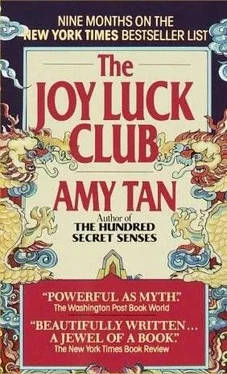"Eh, Syaujye ," she called to me over the loud noise of the machines. I was grateful to hear her voice, to discover we both spoke Mandarin, although her dialect was coarse-sounding. "Did you ever think you would be so powerful you could determine someone else's fortune?" she asked.
I didn't understand what she meant. So she picked up one of the strips of paper and read it aloud, first in English: "Do not fight and air your dirty laundry in public. To the victor go the soils." Then she translated in Chinese: "You shouldn't fight and do your laundry at the same time. If you win, your clothes will get dirty."
I still did not know what she meant. So she picked up another one and read in English: "Money is the root of all evil. Look around you and dig deep." And then in Chinese: "Money is a bad influence. You become restless and rob graves."
"What is this nonsense?" I asked her, putting the strips of paper in my pocket, thinking I should study these classical American sayings.
"They are fortunes," she explained. "American people think Chinese people write these sayings."
"But we never say such things!" I said. "These things don't make sense. These are not fortunes, they are bad instructions."
"No, Miss," she said, laughing, "it is our bad fortune to be here making these and somebody else's bad fortune to pay to get them."
So that is how I met An-mei Hsu. Yes, yes, Auntie An-mei, now so old-fashioned. An-mei and I still laugh over those bad fortunes and how they later became quite useful in helping me catch a husband.
"Eh, Lindo," An-mei said to me one day at our workplace. "Come to my church this Sunday. My husband has a friend who is looking for a good Chinese wife. He is not a citizen, but I'm sure he knows how to make one." So that is how I first heard about Tin Jong, your father. It was not like my first marriage, where everything was arranged. I had a choice. I could choose to marry your father, or I could choose not to marry him and go back to China.
I knew something was not right when I saw him: He was Cantonese! How could An-mei think I could marry such a person? But she just said: "We are not in China anymore. You don't have to marry the village boy. Here everybody is now from the same village even if they come from different parts of China." See how changed Auntie An-mei is from those old days.
So we were shy at first, your father and I, neither of us able to speak to each other in our Chinese dialects. We went to English class together, speaking to each other in those new words and sometimes taking out a piece of paper to write a Chinese character to show what we meant. At least we had that, a piece of paper to hold us together. But it's hard to tell someone's marriage intentions when you can't say things aloud. All those little signs-the teasing, the bossy, scolding words-that's how you know if it is serious. But we could talk only in the manner of our English teacher. I see cat. I see rat. I see hat.
But I saw soon enough how much your father liked me. He would pretend he was in a Chinese play to show me what he meant. He ran back and forth, jumped up and down, pulling his fingers through his hair, so I knew- mangjile! -what a busy, exciting place this Pacific Telephone was, this place where he worked. You didn't know this about your father-that he could be such a good actor? You didn't know your father had so much hair?
Oh, I found out later his job was not the way he decribed it. It was not so good. Even today, now that I can speak Cantonese to your father, I always ask him why he doesn't find a better situation. But he acts as if we were in those old days, when he couldn't understand anything I said.
Sometimes I wonder why I wanted to catch a marriage with your father. I think An-mei put the thought in my mind. She said, "In the movies, boys and girls are always passing notes in class. That's how they fall into trouble. You need to start trouble to get this man to realize his intentions. Otherwise, you will be an old lady before it comes to his mind."
That evening An-mei and I went to work and searched through strips of fortune cookie papers, trying to find the right instructions to give to your father. An-mei read them aloud, putting aside ones that might work: "Diamonds are a girl's best friend. Don't ever settle for a pal." "If such thoughts are in your head, it's time to be wed." "Confucius say a woman is worth a thousand words. Tell your wife she's used up her total."
We laughed over those. But I knew the right one when I read it. It said: "A house is not home when a spouse is not at home." I did not laugh. I wrapped up this saying in a pancake, bending the cookie with all my heart.
After school the next afternoon, I put my hand in my purse and then made a look, as if a mouse had bitten my hand. "What's this?" I cried. Then I pulled out the cookie and handed it to your father. "Eh! So many cookies, just to see them makes me sick. You take this cookie."
I knew even then he had a nature that did not waste anything. He opened the cookie and he crunched it in his mouth, and then read the piece of paper.
"What does it say?" I asked. I tried to act as if it did not matter. And when he still did not speak, I said, "Translate, please."
We were walking in Portsmouth Square and already the fog had blown in and I was very cold in my thin coat. So I hoped your father would hurry and ask me to marry him. But instead, he kept his serious look and said, "I don't know this word 'spouse.' Tonight I will look in my dictionary. Then I can tell you the meaning tomorrow."
The next day he asked me in English, "Lindo, can you spouse me?" And I laughed at him and said he used that word incorrectly. So he came back and made a Confucius joke, that if the words were wrong, then his intentions must also be wrong. We scolded and joked with each other all day long like this, and that how we decided to get married.
One month later we had a ceremony in the First Chinese Baptist Church, where we met. And nine months later your father and I had our proof of citizenship, a baby boy, your big brother Winston. I named him Winston because I liked the meaning of those two words "wins ton." I wanted to raise a son who would win many things, praise, money, a good life. Back then, I thought to myself, At last I have everything I wanted. I was so happy, I didn't see we were poor. I saw only what we had. How did I know Winston would die later in a car accident? So young! Only sixteen!
Two years after Winston was born, I had your other brother, Vincent. I named him Vincent, which sounds like "win cent," the sound of making money, because I was beginning to think we did not have enough. And then I bumped my nose riding on the bus. Soon after that you were born.
I don't know what caused me to change. Maybe it was my crooked nose that damaged my thinking. Maybe it was seeing you as a baby, how you looked so much like me, and this made me dissatisfied with my life. I wanted everything for you to be better. I wanted you to have the best circumstances, the best character. I didn't want you to regret anything. And that's why I named you Waverly. It was the name of the street we lived on. And I wanted you to think, This is where I belong. But I also knew if I named you after this street, soon you would grow up, leave this place, and take a piece of me with you.
Mr. Rory is brushing my hair. Everything is soft. Everything is black.
"You look great, Ma," says my daughter. "Everyone at the wedding will think you're my sister."
I look at my face in the beauty parlor mirror. I see my reflection. I cannot see my faults, but I know they are there. I gave my daughter these faults. The same eyes, the same cheeks, the same chin. Her character, it came from my circumstances. I look at my daughter and now it is the first time I have seen it.
Читать дальше












